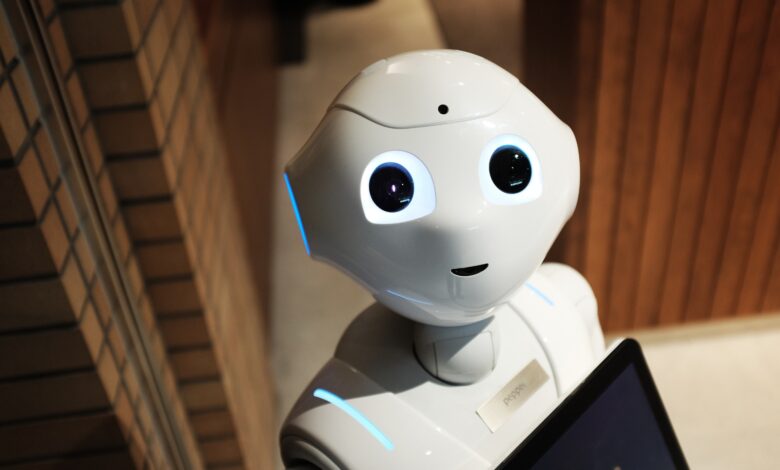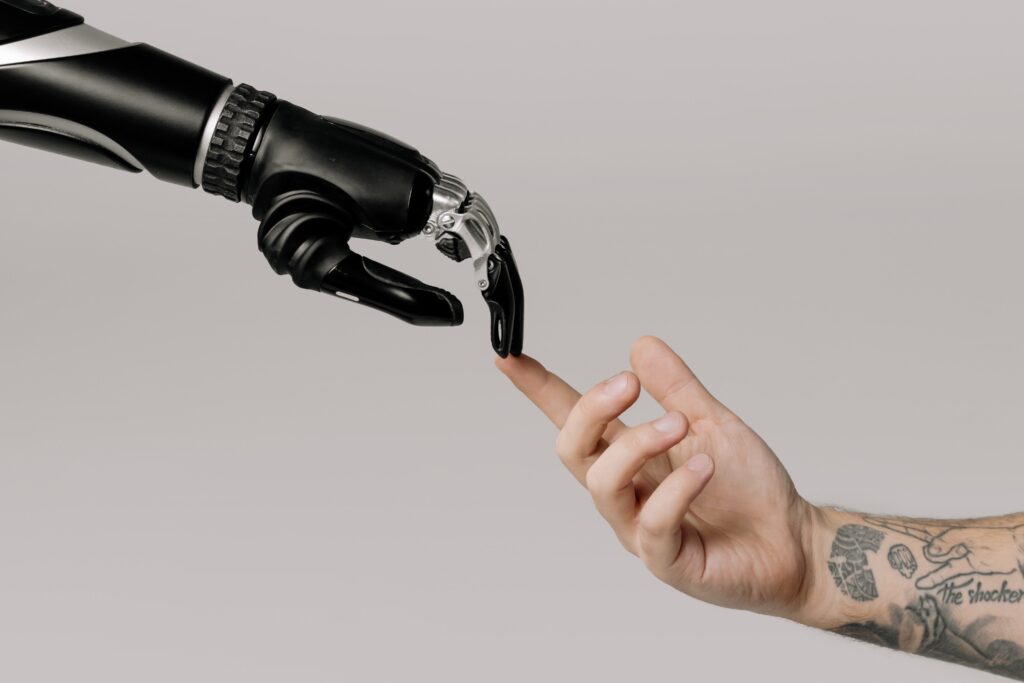5 Positive Impacts of AI on Business
How is AI Impacting Business

From 2020 to 2022, AI startups received a total annual investment of $5 billion USD. This fascinating fact highlights the rapid evolution of artificial intelligence (AI) and its impact on businesses worldwide. In this blog post, we will explore the 5 positive impacts of AI on business and how this technology is revolutionizing various industries.
5 Positive Impacts of AI on Business
AI is set to become an indispensable tool for businesses of all sizes, from enhancing customer experiences to streamlining operations and boosting productivity. Here are the 5 positive impacts of AI on business:
- Transforming Customer Experiences
- Boosting Operational Efficiency
- Revolutionizing Marketing and Advertising
- Empowering Data-Driven Decision-Making
- Ethical Considerations and Human-AI Collaboration
So, let’s dive in and discover the potential that lies ahead!
Transforming Customer Experiences:
With AI, businesses revolutionize customer experiences. Advanced chatbots and virtual assistants powered by Natural Language Processing (NLP) algorithms are becoming increasingly capable of understanding and responding to customer queries. This not only saves time but also enhances the overall user experience.
Personalization is another aspect where AI shines, allowing companies to tailor their offerings to individual customer preferences. AI can analyze customer data to anticipate their needs and deliver personalized recommendations through predictive analytics. These advancements foster stronger customer relationships, drive engagement, and ultimately lead to increased sales and customer loyalty.
Boosting Operational Efficiency
AI possesses immense potential in the realm of streamlining and optimizing business operations. Intelligent automation and robotic process automation (RPA) can manage repetitive and monotonous tasks, thereby liberating human resources to concentrate on more strategic and innovative endeavors.
AI-driven algorithms scrutinize extensive volumes of data and furnish invaluable insights, empowering businesses to make decisions grounded in data and uncover novel prospects. From the management of supply chains to the optimization of inventory, AI can assist enterprises in curtailing expenses, minimizing errors, and augmenting overall efficacy.
According to Bergur Thormundsson, the rate of AI integration within the supply chain and manufacturing companies is projected to ascend from 2022 to 2025.
Revolutionizing Marketing and Advertising
The future of AI in business is deeply intertwined with marketing and advertising. AI algorithms can analyze consumer behavior patterns, demographic data, and online interactions to develop highly targeted marketing campaigns.
Businesses can optimize ad placements, budgets, and bidding strategies, resulting in improved conversion rates and return on investment (ROI).
Moreover, AI can also assist in content creation, generating personalized and engaging content that resonates with target audiences. This level of automation empowers marketers to reach the right audience at the right time. Ultimately, it drives brand awareness and skyrockets revenue.
Empowering Data-Driven Decision-Making
AI becomes a crucial tool for utilizing data’s potential as it continues to grow exponentially. AI algorithms can instantly process and analyze enormous amounts of data. It gives companies the ability to find undiscovered patterns, trends, and correlations. It also equips businesses to make data-driven decisions based on precise insights.
Predictive analytics powered by AI can predict future demand, market trends, and customer behavior. It also enables businesses to proactively adapt and gain an advantage over their competitors. In this way, AI is fostering innovation and giving companies a competitive edge by facilitating informed business decisions.
Ethical Considerations and Human-AI Collaboration
The potential of AI is intriguing, but it also raises ethical questions. Businesses must ensure accountability, transparency, and fairness in the use of AI as it becomes more widespread. The development and application of AI must prioritize ethical issues like data privacy and bias reduction.
Businesses must also adopt a human-AI collaboration strategy in which AI enhances rather than replaces human capabilities. Businesses can achieve optimal results by combining creativity, empathy, and critical thinking with the speed and accuracy of AI algorithms.
AI gives companies the ability to precisely target their audience, improve campaigns, and increase ROI in the marketing and advertising space. AI can help marketers create content that resonates with consumers, increasing brand awareness and boosting customer engagement.

Related Post: This is how AI will change the world of business in future
Frequently Asked Questions
What is the future of AI in business?
The future of AI in business is highly promising. It is anticipated that AI technology will revolutionize a number of business processes, including data-driven decision-making, marketing and advertising, operational efficiency, and customer experiences. Artificial intelligence (AI) will give businesses the tools they need to automate repetitive tasks, personalize customer interactions, improve marketing initiatives, and make data-driven decisions.
Can AI improve operational efficiency in businesses?
Absolutely. AI can significantly improve operational efficiency in businesses by automating repetitive and mundane tasks. Intelligent automation and robotic process automation (RPA) can handle tasks such as data entry, invoice processing, and inventory management, freeing up human resources to focus on more strategic activities. AI algorithms can also analyze data to optimize processes, reduce costs, and minimize errors.
How does human-AI collaboration play a role in the future of businesses?
The future of business depends on human-AI collaboration. Human intelligence brings creativity, empathy, and critical thinking to the table while AI can automate tasks and offer data-driven insights. Businesses should adopt a collaborative strategy where AI enhances human capabilities, allowing staff to concentrate on making strategic decisions and solving problems. Businesses can achieve the best results and promote innovation by combining the strengths of humans and AI.
How can businesses prepare for the future of AI?
Businesses should invest in AI talent and expertise to prepare for the future of AI. They should foster a culture of learning and upskilling to ensure that employees can effectively use AI tools. It is essential to stay updated with the latest AI advancements, industry trends, and best practices. Moreover, businesses should prioritize ethical considerations, establish clear guidelines for AI use, and create frameworks for data privacy and security.
What industries will be most impacted by the future of AI?
The impact of AI will be significant across various industries. Sectors such as healthcare, finance, retail, manufacturing, and customer service are expected to undergo substantial transformations. However, virtually all industries can benefit from AI in areas such as customer engagement, operational efficiency
Final Thought:
Ai has many positive impacts on business and the future of AI in business is bright and transformative. Embracing AI technologies will unlock new opportunities, improve customer experiences, streamline operations, and empower data-driven decision-making.
However, it is critical to address ethical concerns and foster a collaborative approach that integrates human intelligence with AI capabilities. By doing so, businesses can stay at the forefront of technological advancements and thrive in the AI-driven era.






